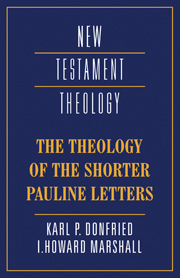Book contents
- Frontmatter
- Contents
- Editor's preface
- List of abbreviations
- THE THEOLOGY OF I THESSALONIANS
- Note on the biblical translations
- 1 The setting of 1 Thessalonians
- 2 The theology of 1 Thessalonians
- 3 1 Thessalonians, the Pauline corpus and Acts
- 4 The significance of 1 Thessalonians for today
- THE THEOLOGY OF 2 THESSALONIANS
- THE THEOLOGY OF PHILIPPIANS
- THE THEOLOGY OF PHILEMON
- Select bibliography
- Indices (Thessalonians)
- Indices (Philippians, Philemon)
3 - 1 Thessalonians, the Pauline corpus and Acts
Published online by Cambridge University Press: 05 June 2012
- Frontmatter
- Contents
- Editor's preface
- List of abbreviations
- THE THEOLOGY OF I THESSALONIANS
- Note on the biblical translations
- 1 The setting of 1 Thessalonians
- 2 The theology of 1 Thessalonians
- 3 1 Thessalonians, the Pauline corpus and Acts
- 4 The significance of 1 Thessalonians for today
- THE THEOLOGY OF 2 THESSALONIANS
- THE THEOLOGY OF PHILIPPIANS
- THE THEOLOGY OF PHILEMON
- Select bibliography
- Indices (Thessalonians)
- Indices (Philippians, Philemon)
Summary
THE EARLY AND THE LATE PAUL
General perspectives
In several of our previous discussions we have compared, on occasion, selected themes in 1 Thessalonians with other writings in the New Testament and particularly with some of the other Pauline letters. Our goal in this section will be to engage in a brief comparison of the early Paul with the late Paul and then, in the section that follows, we will present a comparison of the early Paul of 1 Thessalonians with the portrait of the Apostle found in Acts. At the outset it will be important to state a general principle, namely, that the proper starting point for the analysis of Pauline thought must be 1 Thessalonians, especially since it contains the key to the theology of the early Paul, and therefore, we would insist, also the key to understanding the theology of the late Paul. Although a whole range of additional topics needs to be investigated – for example, a further discussion of eschatology, flesh-spirit, sin, pre-existence christology and the related christological developments alluded to earlier on in this study, the theology of the cross, baptism and the church as the body of Christ, the progress and maturation of the Christian in and according to the Spirit, and ethics – we will limit ourselves to some concise remarks with regard to the theme of the law and the theme of justification in view of the fact that these seem to dominate the discussion about the validity of an early Pauline theology different from the later one manifest in Galatians and Romans.
- Type
- Chapter
- Information
- The Theology of the Shorter Pauline Letters , pp. 64 - 72Publisher: Cambridge University PressPrint publication year: 1993



